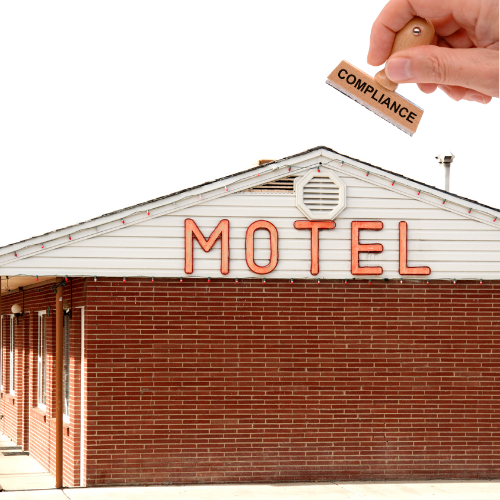Contact Us
1300 76 78 02Motel Compliance - 2025 2004
While we often focus on preparing your business for sale or offering tips for prospective buyers, it's equally important to step back and perform a general compliance health check from time to time. Legislation is constantly evolving, and motels are subject to a wide range of legal obligations. These include state, local, and federal requirements that must be understood and adhered to. Some of the most relevant areas of compliance include:
Local Council requirements
Most businesses are required to hold specific licences issued by their local council. These may include:
• Food business licence
• Accommodation registration
• Signage permits
Council requirements can vary over time, and obtaining the necessary licences may involve lengthy processing times, periodic inspections, or up-to-date staff training. It’s essential to stay informed and ensure your business remains compliant with your local council’s current regulations.
Fire Safety
Motel owners and operators in Queensland are legally responsible for ensuring compliance with fire safety regulations. As motels are classified as "high occupancy" buildings, they are subject to a range of building codes, local council requirements, and workplace health and safety obligations.
Any fire safety installations in buildings must be capable of operating to performance standards to be effective and reliable in the event of a fire. Furthermore, there are requirements for regular maintenance testing and recording to ensure that fire safety installations continue to provide appropriate safety standards.
If you have not done so recently, it is strongly recommended that you engage a qualified professional to inspect your premises and verify that all fire safety systems and devices are properly installed, maintained, and fully operational. You may also be required to provide a yearly occupier's statement to the Commissioner of the Queensland Fire Department.
Work Health and Safety Act 2011 (the WHS Act)
The Work Health and Safety Act (WHS Act) and its accompanying regulations impose a range of obligations on businesses. For motel operators, key areas of focus include maintaining a safe working environment, managing asbestos risks, and ensuring regular testing and tagging of electrical equipment.
There is a general duty to ensure the health and safety of workers. To meet this obligation, it’s highly advisable to engage a qualified professional to conduct a workplace health and safety review. This can help you implement risk management policies tailored to your motel, including reviewing your insurance coverage, developing training programs for both new and existing staff, and identifying potential areas of risk within your operations.
Responsibility for managing asbestos-related risks rests with the person in control of the workplace, typically the tenant or business operator. This includes maintaining an up-to-date asbestos register, which must be reviewed at least every five years. The register requirement applies to all buildings constructed before 1 January 1990, or where asbestos is known or suspected to be present.
Additionally, moteliers must ensure that all electrical equipment is tested and tagged at regular intervals, generally every two years, to remain compliant with WHS obligations and reduce the risk of electrical hazards.
The Australian Consumer Law (ACL)
The Australian Consumer Law (ACL) is a national framework that governs fair trading practices between businesses and consumers. At its core, the ACL requires businesses to operate with integrity and adhere to fair business practices.
Generally speaking, businesses must:
• Be honest and clear and give truthful information about their products, services and prices.
• Respect consumer rights and follow the rules on refunds, repairs or replacements and
• Ensure fair contracts. All contracts need to be easy to understand and without unfair terms or hidden fees.
It is worth giving some thought to the application of this to your business and consider your relationship with any online booking platforms, your standard terms of booking and any other contracts.
Stay informed
Now is a good time to step back and review the systems, procedures, and legal obligations that apply to your motel business. While we’ve highlighted only a few key pieces of legislation, your specific compliance requirements will vary depending on your location and the services you offer.
It’s likely there are additional areas to consider beyond those mentioned—such as liquor licensing, pool safety, and privacy laws, to name a few. Every motel is different, and understanding your unique obligations is critical.
When you consider the significant time, effort, and sacrifice that goes into running a successful business - whether it's long hours, managing staff, marketing, or keeping up with paperwork - it makes sense to proactively manage legal compliance and reduce your risk exposure.
Waiting until a fine or regulatory penalty arrives is too late. Often, simple steps taken early can prevent costly consequences down the track.
Please take our comments as general guidance and contact CRE Brokers or Mahoneys to obtain timely and practical legal advice on the actual issues you are facing.
Author,
Amy O’Donnell
Mahoneys

